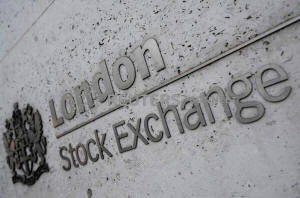European stocks climb to record on hopes of limited coronavirus economic
hit
 Send a link to a friend
Send a link to a friend
 [February 14, 2020]
By Tom Wilson [February 14, 2020]
By Tom Wilson
LONDON (Reuters) - Stock markets across the
world ticked higher on Friday, as investors bet that the damage to the
global economy from China's coronavirus outbreak would not be
long-lasting.
Europe's broad Euro STOXX 600 <.STOXX> hit a record high, gaining 0.1%
to mirror gains in Asia after a choppy start to the day.
Indexes in London <.FTSE> and Frankfurt <.GDAXI> gained 0.1% and 0.2%
respectively, with the former moving higher after AstraZeneca <AZN.L>
shares turned positive. The drugmaker had earlier fallen 5% after it
said it would take a hit from the coronavirus outbreak.
It was a similar picture in Paris <.FCHI>, which clawed back some early
losses as Renault <RENA.PA> shares turned positive. It was last down
0.1%.
Renault had dropped over 4% on its first loss in 10 years as the car
company set a lower operating margin goal for 2020, a crunch year for
its planned reboot alongside partner Nissan after a scandal surrounding
former boss Carlos Ghosn.
Wall Street futures <EScv1> pointed to a slightly higher open.
Chinese health authorities reported more than 5,000 new cases of the
disease, with the National Health Commission saying it had recorded 121
new deaths on the mainland on Feb. 13, taking the accumulated total
infected to 63,851 people.

Investors said they thought the economic impact of the outbreak would
not be as deep as feared, with some also finding succour in a spread
beyond China that is not as rapid as feared.
Others have latched on to the possibility of further central bank
stimulus measures in response to any slowdown. China's central bank, for
example, has already pumped liquidity into its economy.
"Our base case is that the virus can be largely controlled by
end-March," Mark Haefele, chief investment officer at UBS Global Wealth
Management, wrote to clients.
"The negative impact on the economy will be mostly confined to 1Q," he
wrote, predicting that growth would rebound from March on the release of
suppressed demand and monetary and fiscal policy support.
MSCI world equity index <.MIWD00000PUS>, which tracks shares in 49
countries, was flat.
Earlier, Asian shares had earlier risen towards their second straight
week of gains, helped by hopes governments will make provisions to
soften the impact on their economies from the coronavirus epidemic.
MSCI's broadest index of Asia-Pacific shares outside Japan
<.MIAPJ0000PUS> rose 0.1% for a weekly gain of almost 2%. China's
blue-chip CSI300 shares <.CSI300>, meanwhile, rose 0.7%, having staged a
stunning recovery to claw back 95% of their losses made after the
outbreak.
"China is already easing its monetary policy and providing more
liquidity while more stimulus is likely," said Yukino Yamada, senior
strategist at Daiwa Securities.
In its weekly number crunch of markets, analysts at BofA said there had
been a record $23.6 billion pumped into bond funds over the last week
and big inflows into almost everything else as well.
They also spotted that an interest rate cut in Mexico on Thursday had
chalked up the 800th cut by global central banks since the collapse of
Lehman Brothers in September 2008. That works out roughly one every five
days on average.
[to top of second column]
|

The London Stock Exchange Group offices are seen in the City of
London, Britain, December 29, 2017. REUTERS/Toby Melville/File Photo

Still, some did say they were dialling down bets on equities amid
lingering uncertainty on how the crisis would unfold.
"We have actually taken some money out of equities this week," said
Rory McPherson, head of investment strategy at Psigma Investment
Management.
"Markets have been overly focused on the good, and not giving a
balanced view on whether the stimulus from China isn't effective."
EURO BLUES
In currency markets, traders had other matters than the cornoavirus
on their minds.
The euro <EUR=EBS> slumped to another near-three-year low, with
worries lingering about slowing growth in the euro zone and rising
political uncertainties in Germany.
Euro zone growth slowed as expected in the last quarter of 2019 as
French and Italian GDP shrank but employment growth picked up more
than expected, official estimates showed.
The euro did not waver on the numbers, having earlier fallen to as
low as $1.0827.
The single currency last stood flat at $1.08390. It has lost 1% so
far this week and is on track for its worst two-weekly performance
since mid-2018.
Others market players noted growing demand for the U.S. dollar.
"Investors will surely avoid Asia for the time being and will shift
funds to the U.S., geographically the most separated from the
region," said Norihiro Fujito, chief investment strategist at
Mitsubishi UFJ Morgan Stanley Securities.
Against a basket of currencies, the dollar <.DXY> hit a four-month
high and was last at 99.115. It has risen 1.8% so far this month.
The U.S. currency has been trampling everything in its path,
including emerging market currencies.
Brazil's real <BRL=> has hit a record low forcing its central bank
to intervene to prop it up, while Turkey's lira <TRY=> has crumpled
to a near nine-month low.

Oil edged higher and was on track for its first weekly gain in six
weeks, backed by expectations that producers will implement deeper
output cuts to offset slowing demand in China caused by the
coronavirus epidemic. Brent crude futures <LCOc1> were up 85 cents
at $57.19 a barrel.
For Reuters Live Markets blog on European and UK stock markets,
please click on: [LIVE/]
(Reporting by Tom Wilson in London; Additonal reporting by Marc
Jones in London and Hideyuki Sano in Tokyo; Editing by Angus MacSwan
and Jane Merriman)
[© 2020 Thomson Reuters. All rights
reserved.] Copyright 2020 Reuters. All rights reserved. This material may not be published,
broadcast, rewritten or redistributed.
Thompson Reuters is solely responsible for this content. |